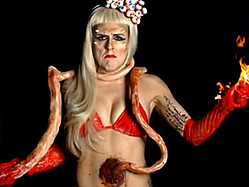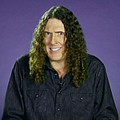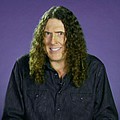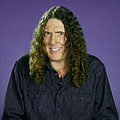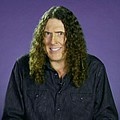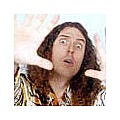I often tell people the first cassette I bought with my own money was the Beastie Boys' License to Ill. This is, of course, a lie: It was actually "Weird Al" Yankovic's 1986 album Polka Party!, which featured classics like "Living With a Hernia," "Addicted to Spuds" and "Toothless People," a send-up of Mick Jagger's "Ruthless People" that Wikipedia rather fastidiously describes as "a song that focuses around elderly people who are missing their teeth."
You can probably understand the reason I've lied about it for all these years — Weird Al has never exactly been the coolest guy in the world, after all — but since I'm coming clean now, I'd also like to admit that the second and third cassettes I ever bought were Yankovic's, too: his self-titled 1983 debut (I'd spend hours studying its illustrated cover, mostly because I didn't have many friends) and the follow-up, In 3-D, which won Al a Grammy for his food-centric take on Michael Jackson's "Beat It," a song called, appropriately enough, "Eat It."
Shoot, eventually, I owned all the early Al cassettes: Dare to Be Stupid, Even Worse (I remember recording the video for "Fat" off this very channel), the "UHF" soundtrack. I used to carry them around in one of those little suitcases and listen to them on my Walkman during family vacations (they definitely made the trip to Boca Raton that one year). My parents were probably worried about me. And if they weren't, well, they probably should have been.
Of course, as is the case with most things, I eventually grew out of my Weird Al phase. The last album of his I ever bought was 1992's Off the Deep End (the one with "Smells Like Nirvana" on it), and truth be told, I haven't listened to a single thing he's done since, aside from the occasional single ("Amish Paradise," "White & Nerdy") that somehow managed to perforate the pop-culture membrane. Instead, I slowly became obsessed with so-called real music — bands like Nirvana and the Breeders, Tortoise and Pavement, Built to Spill and Modest Mouse. I've continued down that path ever since, which is why I'm supposed to be obsessed with the new Bon Iver album (which, thanks to songs like "Beth/Rest," is sort of like a Weird Al record, really), even though I'm really not.
Since we parted ways, Al has released six full-length albums, the most recent of which (Alpocalypse) hit stores on Tuesday (June 21). I haven't heard it, even though I've been told most of the songs have been floating around online for months. Chances are, you haven't either, though perhaps you have heard the Lady Gaga parody and seen the accompanying music video. The latter is not terribly great, mostly because the CGI makes it feel almost un-Al, but still, I suppose that doesn't really matter much. If Weird Al is anything, he's critic-proof.
But in the days since the Alpocalypse, I've found myself thinking back to the days when Yankovic was my favorite artist, and I've realized something rather fascinating: Basically everything I know about popular music, I learned from Weird Al. This was mainly because, as an 8-year-old, I didn't view songs like "The Brady Bunch," "The King of Suede" or "I Want a New Duck" as parodies of popular hits, mostly because I had never heard the originals. I wasn't smart enough to pick up the nods to bands like Devo and Oingo Boingo on tracks like "Dare to Be Stupid" and "You Make Me," because, you know, I was 8. I certainly didn't get the joke behind "(This Song's Just) Six Words Long," because vapidity wasn't a concept I was familiar with. Shoot, the first time I heard some of the Rolling Stones' best cuts was when Al covered them on "The Hot Rocks Polka."
In short, almost all of his songs were originals to me. They're how I learned about stuff like verse-chorus structure and solos and synthesizers. They're probably why I'd go on to appreciate the slightly skewed work of Beck and Ween (and they're definitely why I love "Your Party" as much as I do). And if you want to dig even deeper, Yankovic's parodies are about the earliest example of the so-called "DIY" aesthetic I ever knew; they're practically punk rock, inasmuch as they represent Al shooting down some of the era's most Sacred Cows, and doing it on his own terms, repercussions be damned.
So, yes, in a lot of ways, I owe everything to "Weird Al" Yankovic. And while I can certainly laud him as the king of the song parody, or point out the fact that he basically laid the groundwork for everything the Lonely Island guys (and 95 percent of the Internet) do these days, I think the most fitting tribute to his greatness is to simply say that without him, I'd probably be working in a bank somewhere. His albums made me love popular music, and I'm pretty sure I'm not the only one who can make that claim. I may not listen to him anymore, but I'll remain forever loyal. Long live the king.
Did Weird Al influence your musical tastes? Let us know in the comments below!
